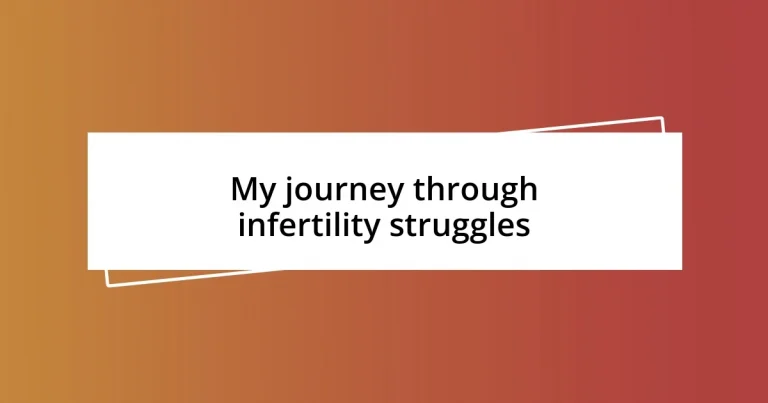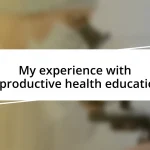Key takeaways:
- Understanding infertility involves emotional, physical, and financial challenges, highlighting the importance of acknowledging shared feelings and seeking medical advice.
- Recognizing signs of infertility like irregular menstrual cycles and prolonged inability to conceive is crucial for taking proactive measures in seeking treatment.
- Building a supportive network and sharing personal stories can provide emotional relief, connection, and empower individuals navigating infertility journeys.
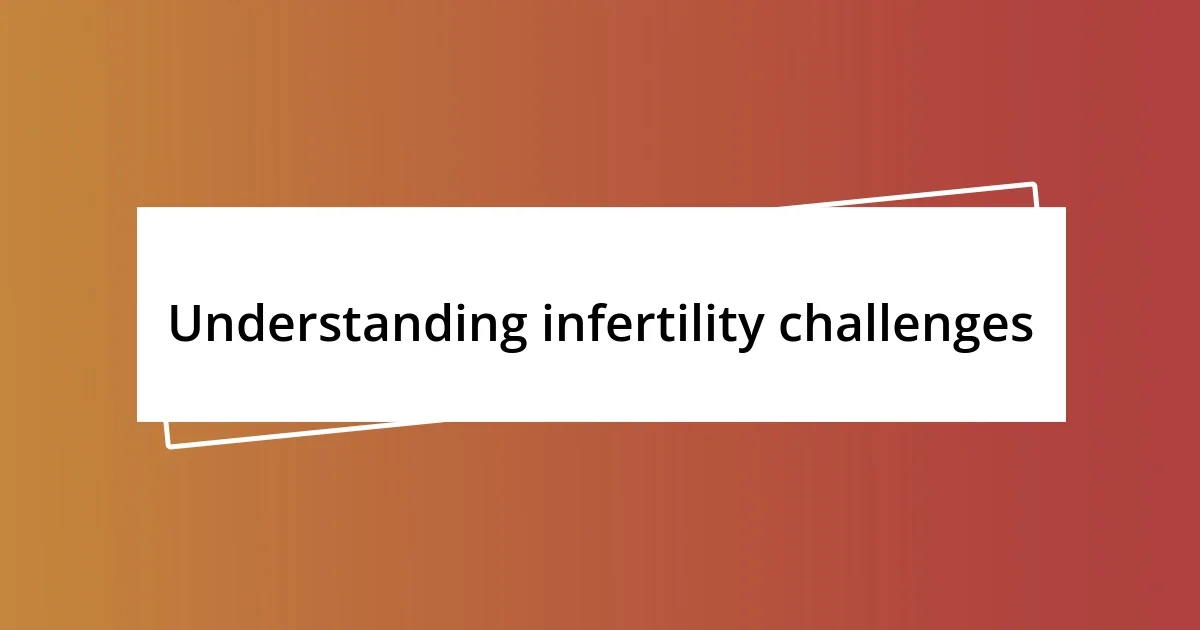
Understanding infertility challenges
Infertility challenges can feel like an emotional rollercoaster. I still remember the days filled with hope as I stared at tiny plastic sticks, desperately willing them to change. It’s exhausting to constantly experience the letdowns, and I often wondered, “Why is this happening to me?”
The combination of physical, emotional, and financial stress can be overwhelming. I recall a time when we had to weigh the options of medical treatments against our savings. Each visit to the clinic became a painful reminder of what wasn’t happening for us, filling my mind with doubts and questions about our future.
Losing the ability to control something so fundamental can deeply impact your sense of self. I found myself grappling with my identity beyond being a hopeful parent. Have you ever felt that way? It’s important to understand that these feelings are shared by many, and acknowledging them can be a crucial step in navigating this complex landscape.
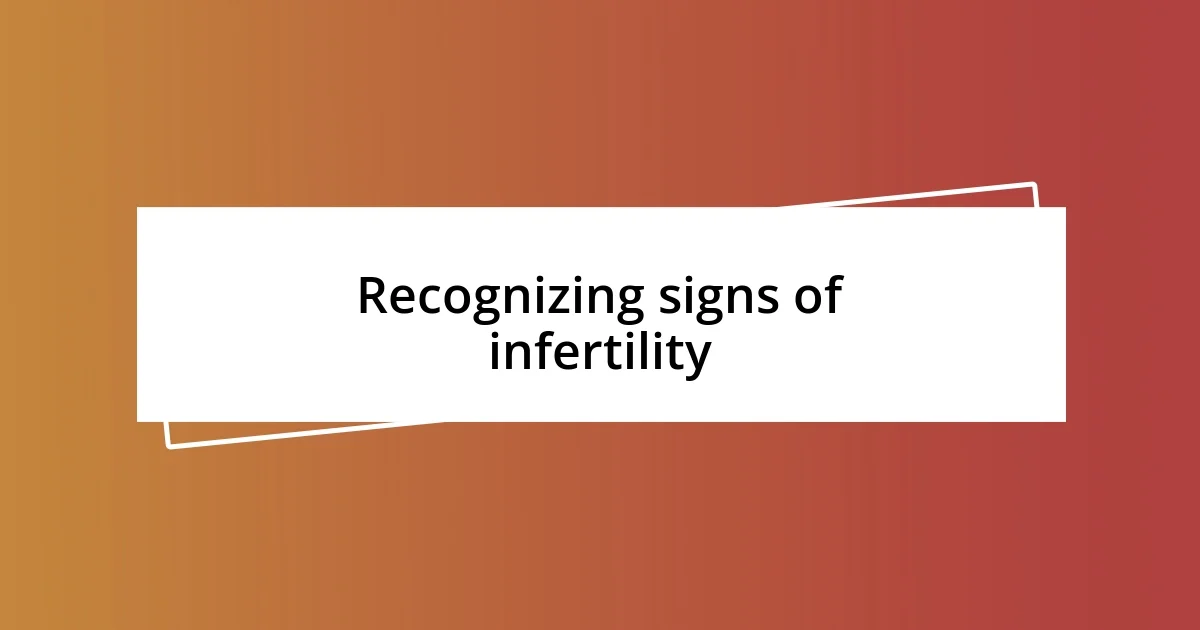
Recognizing signs of infertility
Recognizing the signs of infertility can be a poignant and sometimes painful journey. For many, it begins with irregular menstrual cycles, which I once dismissed as stress-related. However, as I learned more, I realized that consistent fluctuations in my cycle might suggest underlying issues that needed to be addressed.
Another telling sign can be the absence of pregnancy after a year of trying, or six months if you’re over 35. I vividly remember the sinking feeling when each month passed without a positive test, raising countless questions in my mind. These experiences can create a growing sense of urgency and anxiety, urging you to seek answers sooner rather than later.
Physical symptoms like extreme fatigue or painful menstruation also warrant attention. I found myself feeling drained, not just emotionally but physically, and starting to connect the dots. It’s essential to listen to your body and consult with a healthcare professional when these signs arise. Don’t wait until you feel overwhelmed; proactive measures can significantly impact your journey.
| Signs of Infertility | Personal Experience |
|---|---|
| Irregular menstrual cycles | I noticed fluctuations that were hard to ignore and got me concerned. |
| Absence of pregnancy after a year | Every month felt heavier, with unanswered questions weighing on my heart. |
| Extreme fatigue or painful menstruation | These physical symptoms became evident, prompting me to seek help. |
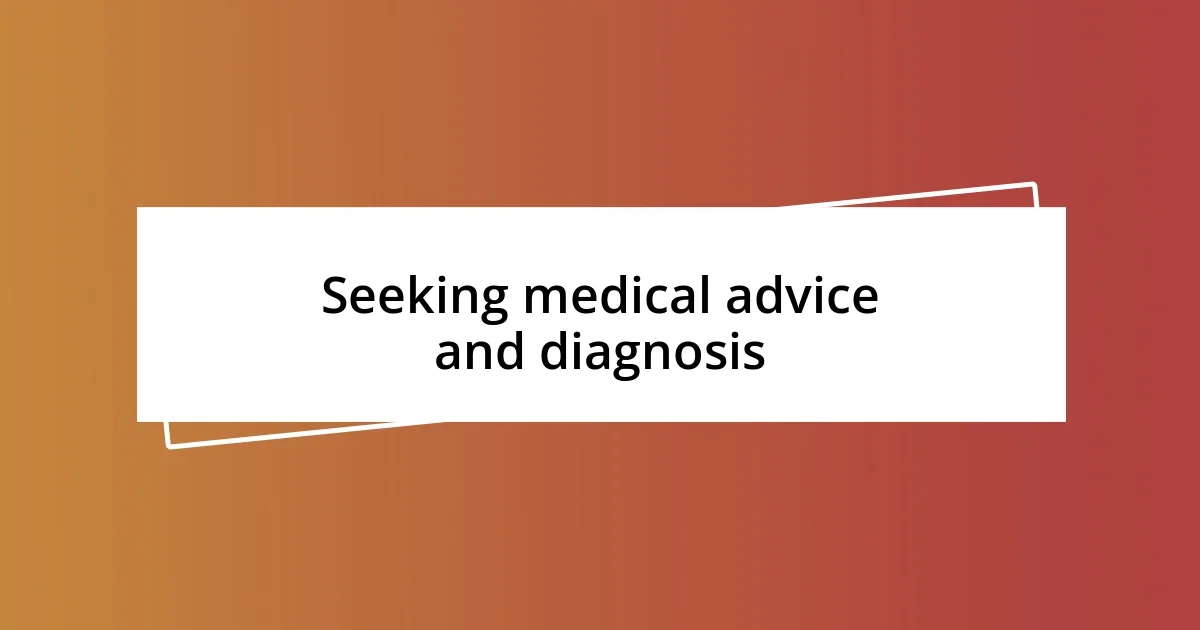
Seeking medical advice and diagnosis
Seeking medical advice can feel daunting, but I learned it’s an essential step towards understanding what might be affecting your ability to conceive. When I finally picked up the phone to schedule that first appointment, my heart raced. I was nervous, yet a spark of hope lingered; maybe this was the path that would lead me to answers. As I sat in the waiting room, I couldn’t help but wonder about the tests and discussions that awaited me. The anticipation was nerve-wracking, but I knew I was taking control of my journey.
- Be prepared with questions about underlying conditions like Polycystic Ovary Syndrome (PCOS) or endometriosis, which your doctor may investigate.
- Consider a fertility check-up after a year of trying (or six months if you’re over 35) to establish a timeline.
- Don’t hesitate to discuss your medical history, including previous pregnancies or menstrual irregularities, as they can provide vital clues.
Each step in the diagnosis process felt like peeling back layers of uncertainty. I recall my doctor explaining hormone tests and imaging procedures; it was overwhelming yet necessary. Having someone explain the process not only clarified my options but also alleviated some of the weight I felt on my shoulders. By seeking professional insight, I began to sift through the fog of confusion, which slowly led me toward a clearer understanding of my body and its needs.
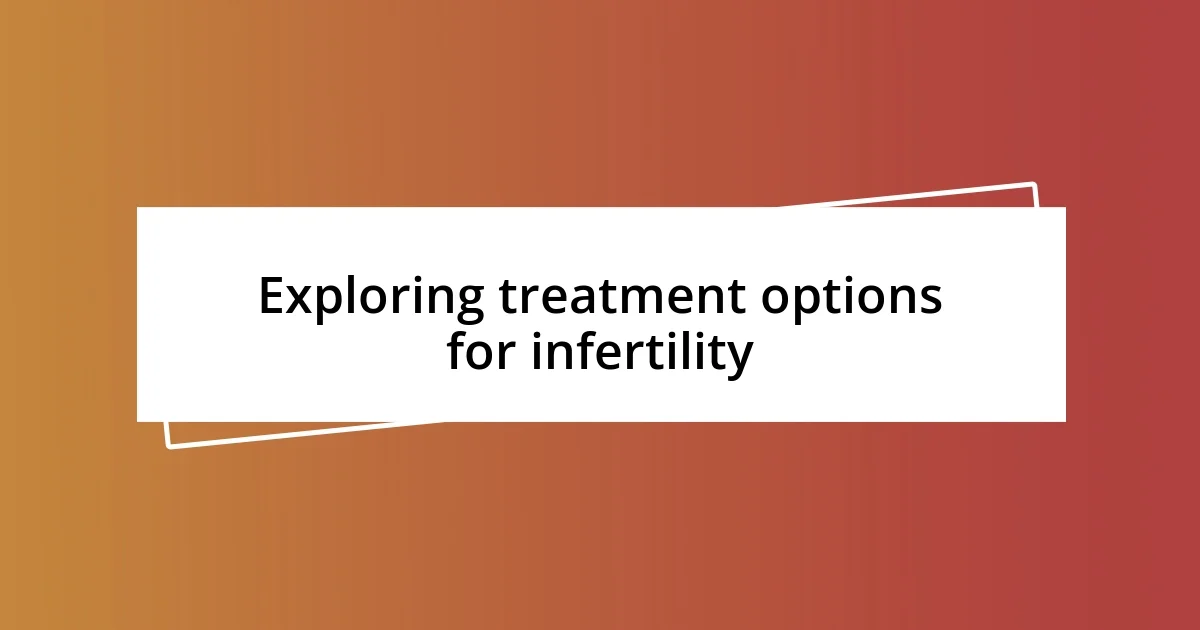
Exploring treatment options for infertility
Exploring treatment options for infertility can feel overwhelming, but it often begins with understanding the array of possibilities. During my journey, I discovered that lifestyle changes can significantly influence fertility. I remember making small adjustments, like prioritizing nutrition and exercise. It wasn’t an instant fix, but seeing my body respond positively gave me a sense of empowerment.
As I delved deeper, assisted reproductive technologies (ART) became a pivotal part of my exploration. I vividly recall my excitement—and fear—when I first heard about in vitro fertilization (IVF). The thought of a procedure that could bring me closer to pregnancy felt both surreal and hopeful. It was essential for me to weigh the emotional and physical impacts, as well as the financial considerations, which often accompany these treatments. Can you imagine the conflicting feelings of hope and anxiety that come with such decisions? For me, gathering knowledge helped ease that inner turmoil.
Ultimately, discussing options like medications to induce ovulation or surgical interventions became crucial in my pursuit to conceive. I remember sitting down with my specialist, feeling a mix of nervousness and determination as we mapped out my treatment plan. I learned that each option comes with its own set of probabilities and experiences, and understanding them was key. Navigating through this landscape required patience, but I found that each decision led me one step closer to my goal.
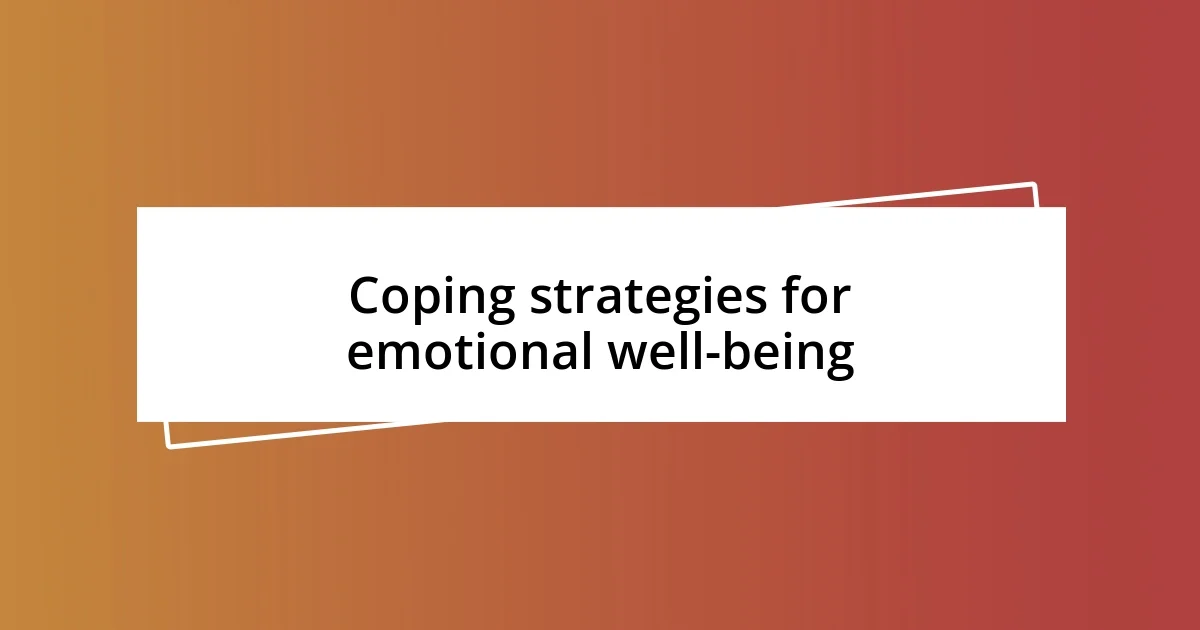
Coping strategies for emotional well-being
Finding effective coping strategies for emotional well-being during infertility was crucial for me. I discovered that sharing my feelings with friends and family provided a sense of relief and helped me feel less isolated in my journey. Have you ever felt like no one could truly understand your struggles? I know I did, but opening up allowed me to connect deeply with those who wanted to support me, transforming my loneliness into a shared experience.
Mindfulness and self-care became vital anchors for my emotional health. I remember carving out time for meditation and gentle yoga, which helped me reconnect with my body and emotions on a deeper level. Those moments, though seemingly small, allowed me to step away from the overwhelming chaos of treatment and decision-making. I found that focusing on my breath brought clarity and calm, making it easier to face each day with renewed hope.
Maintaining a journal was another powerful outlet for my feelings. Pouring my thoughts onto the pages felt cathartic and provided a safe space to sort through the rollercoaster of emotions. Did you ever try journaling? I often reflected on my fears and triumphs, which not only documented my journey but also revealed patterns in my thoughts, helping me process the whirlwind of infertility. It became a personal narrative that celebrated my resilience and offered perspective when I needed it the most.
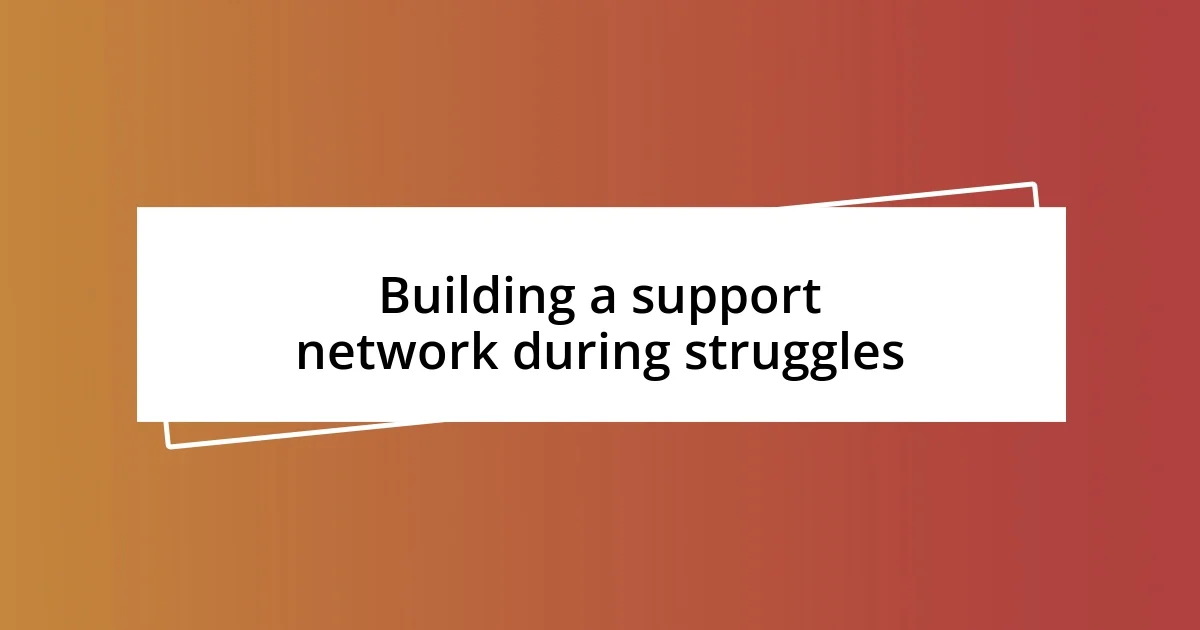
Building a support network during struggles
Building a strong support network during my infertility struggles was truly transformative. I vividly remember the first time I reached out to a close friend who had faced similar challenges. It was liberating to unload my fears and frustrations onto someone who not only listened but also shared their own story. Have you ever felt the weight of your struggles lift when someone else simply understood? For me, that connection helped me feel less alone in a journey that often seemed isolating.
Seeking out support groups online also had a profound impact on my journey. I remember nervously joining a forum late one night, feeling both apprehensive and hopeful. Engaging with others who were navigating the same turbulent waters created a sense of belonging I hadn’t anticipated. Through shared experiences and insights, I not only found comfort but also practical advice that guided me through some of my toughest moments. It made me realize that seeking support isn’t a sign of weakness—it’s a brave step towards healing.
As I continued to build my support network, I discovered the importance of surrounding myself with people who offered not just empathy but also encouragement. I started to notice how my mood shifted when I spent time with those who uplifted me versus those who didn’t quite understand my journey. I remember feeling lighter after conversations with friends who celebrated each small victory, no matter how insignificant it seemed. Have you thought about how certain people influence your emotional landscape? For me, cultivating those connections turned out to be a key part of my resilience.
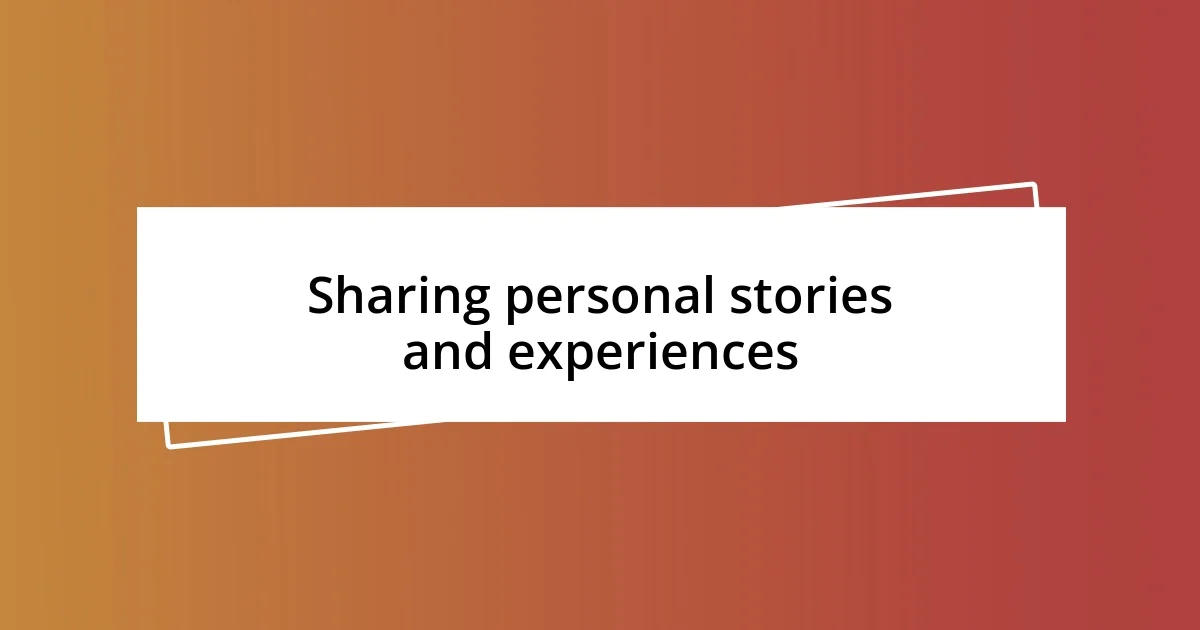
Sharing personal stories and experiences
I can’t emphasize enough the profound impact of sharing my story during my infertility journey. One evening, sitting around a cozy fire with friends, I decided to open up about my struggles. As I spoke, I noticed tears in their eyes, and it struck me how sharing those raw emotions brought us closer. Have you ever experienced that moment when vulnerability transforms the atmosphere? It truly felt like taking off a heavy coat, allowing warmth and understanding to flow in.
I also joined a local women’s group that focused on reproductive health. I vividly remember attending my first meeting, feeling both anxious and excited. Listening to other women share their journeys was like finding my voice in a crowded room. I began to understand that my pain had a place, and that realization helped me heal. Have you ever felt that sense of camaraderie over shared experiences? It was empowering to see that my struggles weren’t isolated but part of a larger community.
Writing my story down became a cathartic experience too. I started a blog where I poured out my feelings, sharing the ups and downs of infertility. One entry, detailing a particularly difficult month, resonated with readers who reached out with their own stories. It opened up a dialogue I never anticipated, allowing others to feel seen and heard. How often do we think we’re alone in our struggles, only to find a community waiting on the other side? That connection reminded me that sharing our experiences isn’t just about our journey—it’s about fostering understanding and empathy in others.











